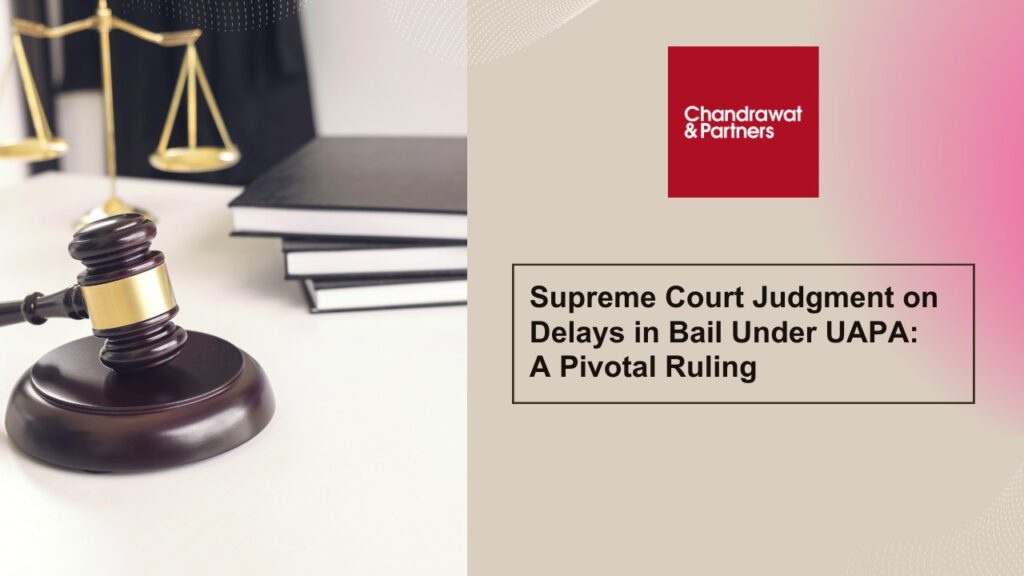Home > Recent Judgements >Supreme Court Judgment on Delays in Bail Under UAPA: A Pivotal Ruling
Feb 15, 2025
Supreme Court Judgment on Delays in Bail Under UAPA: A Pivotal Ruling
On February 15, 2025, the Supreme Court of India delivered a landmark judgment in the case of Shabir Ahmed v. Union of India, addressing significant concerns surrounding the delays in granting bail under the Unlawful Activities (Prevention) Act (UAPA). The judgment reflects the Court’s commitment to safeguarding fairness and upholding the rule of law, particularly in matters involving national security laws. This analysis delves into the key aspects of the ruling, its broader implications, and its potential influence on future jurisprudence.
Background of the Case
The case involved an individual, Shabir Ahmed, who had been charged under UAPA, a stringent anti-terrorism statute that grants extensive powers to law enforcement agencies to detain individuals suspected of involvement in terrorist activities. One of the most contentious features of UAPA is its provision for extended detention without trial, which often leads to significant delays in the granting of bail.
In this instance, Shabir Ahmed’s challenge arose from the prolonged delays in his bail hearing. His case highlighted systemic issues in the judicial process, especially regarding the prolonged detention of accused persons under UAPA without sufficient legal recourse.
Key Findings of the Supreme Court
The Supreme Court’s ruling in Shabir Ahmed v. Union of India focused on two fundamental aspects:
- The Impact of Delays in Bail Proceedings
The Court acknowledged the adverse effects of delays in the bail process under UAPA, which can undermine the fairness of legal proceedings. It emphasized that courts must take into account the time taken to grant bail, especially when such delays arise from procedural inefficiencies or other systemic shortcomings.
The judgment underscored that inordinate delays in granting bail would contravene the constitutional guarantee of a fair trial and the right to personal liberty. The Court recognized that prolonged detention without proper legal justification violates the principles of justice and fairness, and may tarnish the credibility of the legal system.
- Independence of Judicial Decision-Making
The Court also underscored that courts, when exercising their jurisdiction to grant bail or pre-arrest bail, should not be influenced by extraneous factors or external pressures. The ruling made it clear that judicial officers must evaluate bail applications based solely on established legal principles and the specific facts of the case, free from any external bias or influence.
The Court also clarified that bail should not be denied on speculative grounds, such as the possibility of recovery of evidence or potential threats to national security, unless supported by concrete and verifiable evidence. This reinforces the idea that judicial decisions must be rooted in the rule of law, rather than conjecture.
Implications of the Judgment
The judgment in Shabir Ahmed v. Union of India carries substantial implications, particularly with regard to the application of UAPA and its impact on the rights of individuals accused under this law. The ruling addresses key concerns about the procedural delays in UAPA cases and emphasizes the necessity for timely justice.
- Safeguarding Fundamental Rights
This ruling reaffirms the Court’s commitment to upholding the fundamental right to personal liberty. By highlighting the negative consequences of delayed bail proceedings, the Court has reinforced the importance of ensuring that justice is not only done but seen to be done in a timely manner.
- Repercussions for UAPA-Related Cases
This judgment will likely serve as a critical precedent in future UAPA cases, urging a more efficient and transparent judicial process. It establishes that excessive delays in granting bail will not be tolerated, and that detainees should not be held in custody for prolonged periods without a proper legal basis.
- Potential for Legal Reforms
The ruling also calls for a broader examination of the provisions under UAPA, particularly with respect to the rights of accused individuals. While the judgment directly addresses delays in bail proceedings, it could trigger discussions on the need for reform in the law’s application, ensuring that the rights of the accused are balanced with national security interests.
The Court’s decision could potentially lead to an enhanced focus on judicial oversight and procedural reforms, particularly in cases where lengthy detention under UAPA is a recurring issue.
Conclusion
The Supreme Court’s judgment in Shabir Ahmed v. Union of India marks a significant step in ensuring fairness in the judicial process, particularly with respect to cases involving national security laws such as UAPA. By addressing the issue of delays in granting bail, the Court has reinforced the fundamental principle that justice must not be delayed, especially in cases that involve an accused’s right to liberty.
This judgment is poised to influence future cases involving UAPA, ensuring that the bail process is conducted with greater efficiency, transparency, and adherence to constitutional principles. It highlights the importance of judicial independence and the need for decisions to be based on established legal standards, free from external pressures. The ruling serves as a reminder of the need to balance national security concerns with the protection of individual rights, reaffirming the Court’s role in safeguarding fairness within the legal system.
For more information or queries, please email us at
enquiries@chandrawatpartners.com





